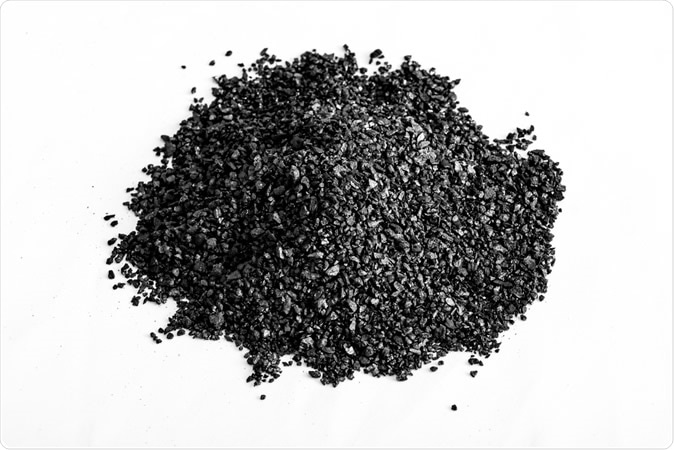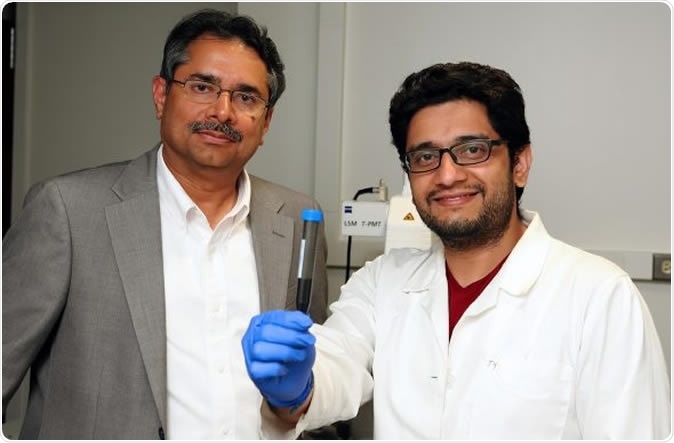A novel charcoal-based drug-delivery system to treat herpes infections topically shows greatly improved efficacy over conventional treatment. Here, the medication called acyclovir, commonly used for herpes infection, was combined with activated carbon particles. Astonishingly for such a simple technology, the researchers found that the doses required were fewer, and the overall duration of treatment shorter, with high efficacy. In fact, the new vehicle even provided protection against infection by the virus in vitro.
The study was reported in the journal Science Advances on August 14, 2019.

Black activated carbon granules. Image Credit: HelloRF Zcool / Shutterstock
The herpes simplex virus (HSV) is a virus which infects human epithelial tissue. There are two types: HSV-1 which causes blister lesions over the tissue of and around the eyes and the mouth, and is a major cause of infectious blindness, and HSV-2 which causes warts to form around the genitals, transmitted by sexual contact. HSV affects more than one in three people the world over, and is also associated with a higher risk of other sexually transmitted diseases.

illustration of Herpes virus. Illustration Credit: Kateryna Kon / Shutterstock
Both types of infections can be treated with the antiviral drug acyclovir. This can be taken orally or applied over the site of infection. When used over the long term, however, it can cause resistance to emerge, while renal damage is another possible sequel. To counter this, other antivirals like ganciclovir have been used topically, but need to be applied up to 10 times daily. Many methods have been tried to overcome the short retention and poor delivery of the active drug on the area of the lesion.
In the current study, the researchers in the current study at the University of Illinois at Chicago focused on the well-known adsorptive properties of activated carbon, a product used in many cosmetic products. This substance consists of finely divided carbon particles with a very large surface area. It is a widely used purifier, because of its immense surface-area to volume ratio, and its large adsorptive capacity, which makes it capable of trapping different types of particles within its spongy structure. It is also a common feature in water filters in order to purify and deodorize water for this reason. Therefore, the scientists reasoned, it might be effective in trapping the viral particles.
Here, activated carbon was used alone and in combination with acyclovir to treat lesions caused by HSV-1 and HSV-2. They found that diluted plain activated carbon reduced the percentage of infected cells by 4% to 60%, if applied to the laboratory culture before the cells were exposed to the viruses.
In a second experiment, they used a mixture of activated carbon with acyclovir, and applied it to the eye or genital area of laboratory mice that were infected with HSV-1 and HSV-2, respectively. The results showed that this mixture was superior to either acyclovir or activated carbon alone in its anti-inflammatory effect and reduction in viral load within the infected cells. They also noted a marked increase in efficiency of action of acyclovir when it was used in combination. In fact, they were able to achieve the same magnitude of reduction in inflammation as well as in viral load with significantly fewer doses compared to the use of the drug alone.
The explanation might be that the drug particles are released from the highly porous activated carbon particles slowly over time. This may be the result of the greater attraction of the herpes virus particles and of other particles in the environment to the charcoal rather than to the drug. This means that they competitively bind to the charcoal, which means the drug is displaced from the carbon into the lesion in a slow but steady manner. In other words, the activated carbon releases acyclovir into the environment only when the virus is also present. The team dubbed the novel system DECON for Drug-Encapsulated Carbon.
In vitro experiments showed that cells treated with DECON showed no evidence of viral infection at low concentrations. When tested with multiple viruses, there was an exponential reduction in viral replication.
No toxic or vision-obstructing effects were observed even at concentrations up to 10 mg/ml. Moreover, activated carbon did not provoke any cytokine response, unlike several nano- and micro-particle-based antivirals.
Researcher Tejabhiram Yadavalli says, “The activated carbon acts like a slow-release drug capsule. Because it likes to bind with the virus, this gives it additional anti-viral properties.” The implications are obvious: increased convenience and safety, with reduced costs of therapy. The experiment also throws up hints that the infection may even be preventable using activated carbon as a sexual lubricant, for instance. Moreover, it may be effective for many other drugs as well.

Deepak Shukla and Tejabhiram Yadavalli. Photo by Jenny Fontaine.
Lead researcher Deepak Shukla comments, “Activated carbon is known to be safe for use by humans and has been used for thousands of years for its purifying properties. We think that using it as a novel drug delivery system could help reduce dosing, cost and risk of toxicity to the kidneys and could eventually be used in lubricants prophylactically to help prevent new HSV genital infection.”
Journal reference:
Drug-encapsulated carbon (DECON): A novel platform for enhanced drug delivery, Tejabhiram Yadavalli, Joshua Ames, Alex Agelidis, Rahul Suryawanshi, Dinesh Jaishankar, James Hopkins, Neel Thakkar, Lulia Koujah and Deepak Shukla1, Science Advances 14 Aug 2019: Vol. 5, no. 8, eaax0780, DOI: 10.1126/sciadv.aax0780, https://advances.sciencemag.org/content/5/8/eaax0780